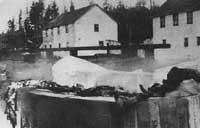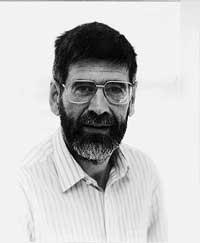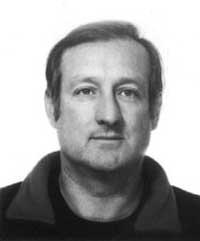Among friends about science
1993/11/01 Aizpurua Sarasola, Joxerra Iturria: Elhuyar aldizkaria
Science together with society
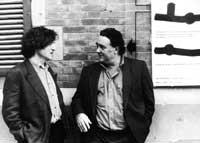
Elh-Jean Marc, how is current physics?
JML-In the last fifty years physicists have not advanced. Moreover, some of the problems that have been discussed throughout this period are meaningless. Despite having obtained concrete mathematical formulas to demonstrate theories, physicists have seen that the reality that these theories represent and that which surrounds us are radically different. There are profound differences between what intuition commands and what nature has shown.
Elh-1968. From that year, in addition to scientific practice, you have immersed yourself in the philosophical and social implications of this practice. From then until today societies, ideologies and policies have changed a lot. What can you say about the relationship between science and ideology in 1993?
JML- I think the analyses carried out in the 1970s are still in force, but with some observations. My generation's view of science was full of contradictions. On the one hand, science was considered neutral or independent from the political context, but something positive was also recognized. On the other hand, it was observed that science was a social activity; in laboratories giant machines of high cost were created and in them hundreds of people worked. Therefore, we clearly saw that science could not be differentiated from society. That is the legacy of the 1970s, but we have not been able to transform this whole experience as an alternative practice. We think that science is of this society and that if there were another society there would also be another science.
Elh- 2000 years ago in China iron bridges, magnetic poles, steam machine, etc. they knew them, but they did not advance. How do you see this topic?
JML- If Chinese society had advanced, probably the knowledge we have today of nature would have been different. It was a way of knowing nature technologically, it was also a scientific embryo, but it had no development. Why?,... I don't know.
In a work carried out by the Club de Elh- Roma it is indicated that capitalism will not be able to maintain the level of development reached to date, and this is due to the limited management of the resources of the planet. It is foreseen, therefore, that capitalism will not be able to develop exponentially as until now. What do you think of this idea?
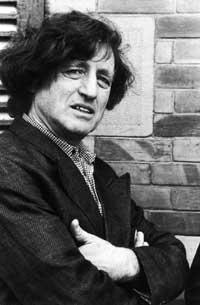
JML- I generally agree with this view, but I think capitalism still has a lot of resources. Crisis and pollution itself, for example, can be the engine of development. However, this situation cannot be maintained for a long time. If not, we will increasingly plunge into crisis. The only solution that I see in the short term is to place science in the cultural context of society; somehow the XVIII. Founded in the nineteenth century Similar to that developed in the twentieth century. Today I see that the disclosure of knowledge is in crisis.
Some believe that mere scientific knowledge serves to solve any problem. For example, should nuclear power plants be created? The traditional answer would be to explain to the human being the operation of the nuclear power plant. But for me the question is not well asked. Instead, we should ask ourselves if we need more energy? The question is not about physics, but about social economy, that is, about a topic in which physicists cannot speak as physicists.
Elh- You get a magazine that wants to unite science and society. On the other hand, he says that the lack of knowledge that the current scientist has about society is very difficult to divulge. What is the meaning of the magazine?
JML- We believe that the scientist must have a clearer awareness of the world around him. He has to recognize that he lives in the same world as other people and, consequently, understand his views on science. He should be interested in literature, cinema and theatre, places where society knows what science thinks. At present there is hardly any communication between science and society. Therefore, our intention in our magazine is to use science by making a culture.
Elh- Is it universal science? Can each people address the challenge of science from its anthropology, language, history?
JML- I often wonder the same thing, but I find no answer. I think there are only two options.
On the one hand, American science can become a world science, totally uniform in scientific principles and their transmission. I think in the last 30 years we have plunged into this trend.
On the other hand, uniformity would not be widespread. Physical laws, biological tests, etc. would be equal in New York, Moscow or San Sebastian and would form the skeleton of science. But a skeleton needs meat to be able to live and that meat would be culture in the case of science.
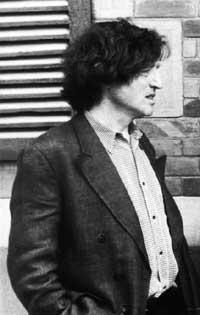
However, if a small town of special characteristics takes the path of resistance, I don't think it has a chance to stay. Its only possibility of permanence is to connect and relate to the outside.
Elh- Increasing use of recycling. When matter is recycled, does the product produced have greater historical memory or more fatigue?
JML- In the American world nothing has historical memory, past or future. It only serves punctual. Our alternative is based on ancient cultures. We must know, seize and transform the historical memory of ancient cultures. In other words, we cannot know where we are going if we do not know where we come from. The philosophy of recycling, for me, must be based on that, but not only on production, but on the economy in general.
Elh- Thank you Jean Marc.
Why science museums?
Elh- Jorge, does he tell us the purpose and activities of the Barcelona Science Museum?
Although it is called JW- Museum, I would say that besides museum is a popular university. Science has an increasing influence on our lives, but at the same time the difference between human beings and science is growing. The aim of the science museum is therefore to bring science closer to human beings. To do this, we try to clarify not only the physical explanation of scientific phenomena, but also their justification, all in a simple and attractive way. It seems that when we speak in a simple way, we enter the world of children and therefore leave out the world of adults. We want to break this topic and for this we do other activities in the museum, such as courses, cycles of conferences, debates, publications, etc. Another objective of the museum is to generate opinion on science. People have their opinion on politics, economics or sport, but science is almost nowhere. Moreover, scientists also do not try to generate opinion about science. In order to generate opinion on science, experts and profane people face each other in cycles called “museum nights”.
What is your legal structure?
We are the private capital JW- Gu Foundation. For us this structure is the best to ensure the neutrality and independence that any science and research project needs.
If we wanted to create a Science Museum in Elh- Euskal Herria, what would be the minimum conditions?
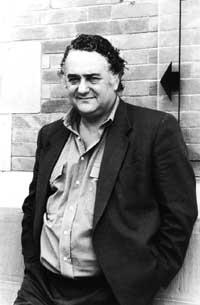
JW- First of all, and in my opinion most importantly, there must be an embryo that is made up of scientists or people in love with science. This embryo has to see and know other museums and, based on that experience, it must develop a project in which scientific topics and the place of location are defined. There must be a willingness to create a science museum and, if there is a will, I would add that failure is not possible. With a minimum of visitors, the project cannot fail culturally. I want to highlight the word culture, since cultural association is usually not economically profitable. Moreover, it would not be good if it were profitable. Revenue collection should not exceed 20% of expenses.
If not, it would be a sign that the museum is not renewed. Therefore, the museum should be associated with one or more financial institutions. Currently in Europe there is enough logistical and intellectual support to carry out such projects. The Science Museum of Barcelona has become itinerant under the title of Science Tent. The aforementioned Scientific Tent has been present in Bilbao, Pamplona and San Sebastian in recent years and I can say that in these rooms the Basque Country meets all the necessary requirements to form its Science Museum.
Elh- In your writings it gives much importance at random, right?
JW- Talking about chance in science is like talking about law. The scientist has always wanted to find laws of nature. Therefore, chance has been considered an enemy to carry out investigations. The analysis of systems that allow understanding topics relevant to science today requires analyzing with their complexity and considering November as an important element in these analyses. Until recently science wanted to put aside November, but when quantum physics comes it can be said that science has signed an agreement with probability and chaos.
Although it may seem surprising, ignorance cannot be ignored to work knowledge.
Elh- How do you see the Basques?
JW- Peculiarity of Euskal Herria, that is, language, people, etc. is very important to me. I have found a great intellectual concern, but violence worries me a lot. For me, violence and knowledge are very united. Knowledge involves tolerance and tolerance is a scientific method in itself. For me a very mystical politician or a very artist bridge builder or a lover full of scientism can be very dangerous. Each one is necessary in his field and at this time I consider it interesting to apply the scientific method in cases of violence.
The scientific method must meet three basic requirements. On the one hand, it is necessary to separate oneself from the object; on the other, it has to be dialectical with the essay (i.e., having methods to collect the consequences of decisions) and finally it must be understandable. I would be bombarded with many scientific methods and tons of knowledge.
Thank you.

Gai honi buruzko eduki gehiago
Elhuyarrek garatutako teknologia




